The adoption of cloud computing solutions has changed the landscape within which companies operate by availing flexible, cost-effective, and scalable technology solutions. Over the next few years, therefore, these platforms are expected to become more and more relevant and provide more sophisticated functionalities that enterprises require. Regardless of whether it is a start-up company wishing to remove inefficiencies or a large global company seeking to innovate, cloud services offer all the tools needed to revolutionize businesses.
Cloud computing platforms are virtual infrastructures that allow a firm to ‘rent’ storage and processing power from a third party. In this article, it is focused on identifying the features, benefits, and niches of the top ten computing platforms of 2025. Whether you’re interested in utilizing these platforms to cut costs, implement higher security measures, or find the application tools to innovate, it becomes important to understand them to come up with decisions that fit your business goals.
What are Cloud Computing Platforms?
Cloud is well-defined as a resilient technology structure, which provides a vast number of computing services over the internet. Such resources include storage, processing, networking, software, and development tools. Contrary to the earlier generation OLTP systems for which very large investments were needed in servers and other supporting structures, most cloud platforms offer a pay-per-use or a subscription model and are affordable by most organizations. These platforms enable businesses to run applications, store and process data, and leverage superior technologies without requiring the physical infrastructure that is required to support such infrastructure.
Different kinds of services are provided by cloud computing including Infrastructure as a Service (IaaS), Platform as a Service (PaaS), and Software as a Service (SaaS). For example, through IaaS, companies get computer resources including servers and storage for their businesses almost seamlessly. PaaS provides a development and deployment environment for creating those applications with no need to be concerned about the infrastructure. SaaS provides ready-made applications such as CRM application software which is already present on the web browsers.
Key Features of Cloud Computing Platforms
Cloud computing platforms are defined by several key features that set them apart from traditional IT systems. Here’s an in-depth look at these features:
- Scalability: The cloud platform has significant flexibility that can easily be adapted depending on the needs of the business. This element can handle fluctuations in either the utilization rate or the number of impressions per session and also guarantees that the companies are charged according to their consumption alone.
- Cost-Efficiency: There are numerous benefits of cloud computing technology but the most important one is cost-effective. Companies remove themselves from having to invest in costly and constantly evolving hardware tools.
- Global Accessibility: Geographical location is a non-issue today as has been witnessed with the adoption of cloud computing. Employees and teams get to use data, applications, and resources from any part of the world if they have an internet connection.
- High Security: Security in today’s cloud platforms; cloud computing providers use even top-notch security technologies such as encryption, firewalls, and multi-factor authentication.
- Automation: Automation features include having automated functions like resource management, application management, and update management. This helps minimize the time and effort needed for the task, reducing human interference, and the IT department does more valuable work.
Benefits of Cloud Computing Platforms
- Cost Savings: Do away with the need to lay out expensive amenities on site.
- Flexibility: Must be sensitive to the ability to change with growth and development of business requirements.
- Collaboration: Improve the level of teamwork through sharing.
- Disaster Recovery: Back up your data and make sure that you can recover it in a short time.
- Innovation: I can only agree that only with the help of such technologies one can grow and develop.
- Sustainability: Minimize carbon foot impressions by cost-friendly data centers.
Quick Comparison
| Platform Name | Ease of Use | Best Fit | Free Plan Available |
| Amazon Web Services (AWS) | Moderate | Startups, enterprises, coders | Yes |
| Microsoft Azure | Complex | Businesses, developers, SMBs | Contact for Pricing |
| Google Cloud Platform (GCP) | Moderate | AI companies, tech organizations | Yes |
| Alibaba Cloud | Moderate | SMEs, startups, Asia-focused businesses | Yes |
| IBM Cloud | Complex | Large corporations, financial, healthcare | Contact for Pricing |
| Oracle Cloud | Complex | Large enterprises, finance, retail | Contact for Pricing |
| Tencent Cloud | Moderate | Gaming, media, e-commerce | Flexible Pricing |
| DigitalOcean | Easy | Developers, startups, small businesses | Yes |
| Linode | Easy | Developers, startups, small businesses | Yes |
| Kamatera | Moderate | Businesses needing tailored solutions | Yes (30-day trial) |
Top 10 Cloud Computing Platforms in 2025
1. Amazon Web Services (AWS)
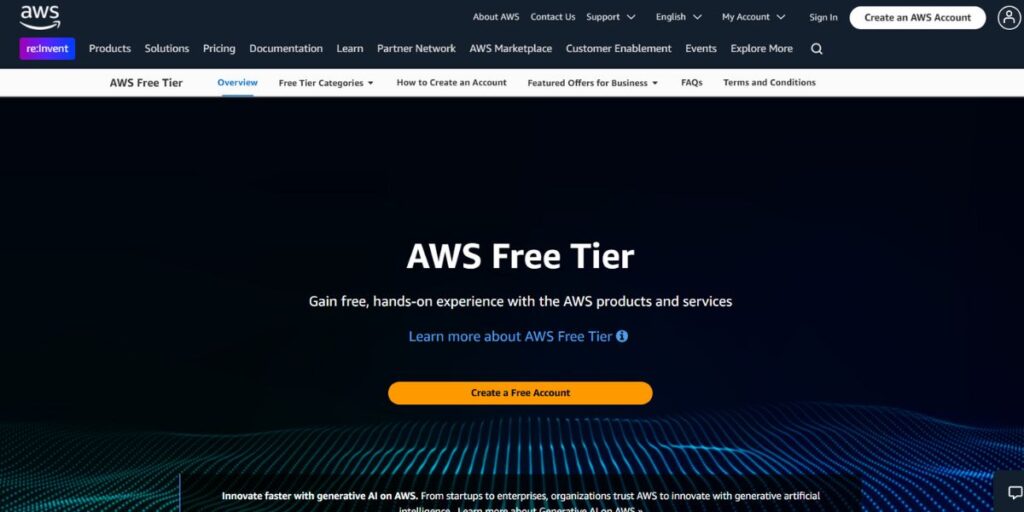
AWS is the biggest Cloud Computing service provider which has services such as storage services, machine learning services, analytical services, serverless computing, etc. AWS is today considered the largest and most influential cloud service provider around the globe and is relied on by startups, large companies, and different governments.
When paired with dbt Cloud, AWS users can streamline data transformation workflows, ensuring faster, more reliable analytics pipelines that optimize performance across cloud-based data environments.
Elastic Compute Cloud commonly known as EC2 guarantees virtual servers’ scalability while AWS Lambda tends to make serverless app development possible. AWS Shield and Protection are such higher layers of security that guard data and assets.
Key Features:
- For the provision of virtual servers Elastic Compute Cloud (EC2) is used.
- Serverless computing: AWS Lambda.
- Preferential security features of enhancing AWS Shield.
Pros:
- Broad service portfolio.
- Strong global network.
- Third-party integration is one of the key features that distinguish advanced marketing automation from the rest.
- Amazone ai tool
Cons:
- Complex pricing.
- Having a high level of complexity for new users to take on.
- Occasional service outages.
Ideal For:
- Companies, new businesses, coders.
Pricing:
- Free
Rating: 4.8/5
2. Microsoft Azure

Microsoft Azure offers almost all the cloud services required for hybrid and especially AI solutions-based workloads. Still, it is a natural choice for businesses that are already using Microsoft Windows and Microsoft Office tools in particular. This is a list of some of the primary products: Development: Azure AI for building intelligent applications Software development: Azure DevOps Hybrid cloud: connecting on-premises environments to Microsoft Azure Sky.
Key Features:
- Hybrid cloud capabilities.
- Azure AI for intelligent tool
- Azure DevOps: An Overview for Streamlined Development.
Pros:
- It works well and is highly integrated with several Microsoft tools.
- High security and compliance.
- Competitive pricing models.
Cons:
- Complex interface.
- The price of superb features is higher.
- There is limited support in some regions.
Ideal For:
- Businesses, development, small and medium companies.
Pricing:
- Contact For Pricing
Rating: 4.7/5
3. Google Cloud Platform (GCP)
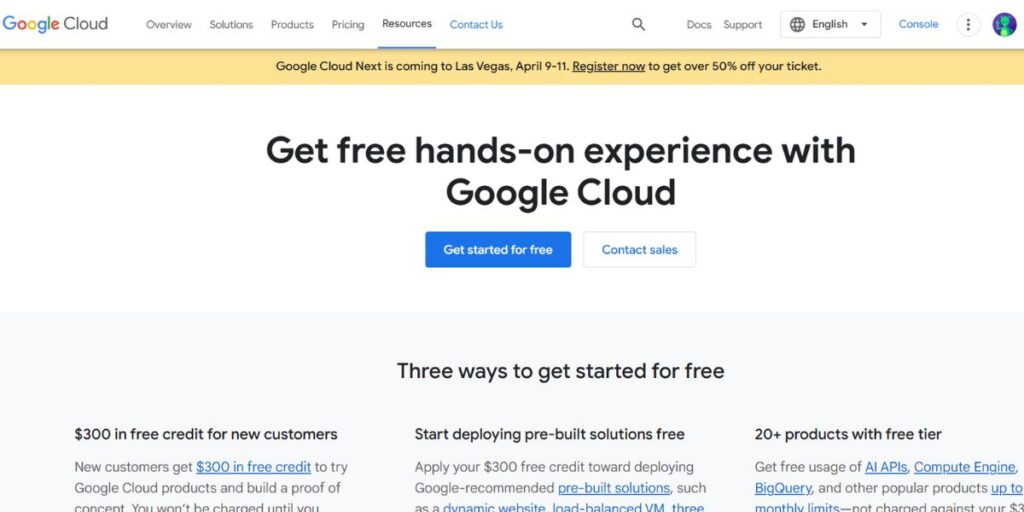
Google Cloud Platform especially stands out as a leader in innovative moderate AI and data analytic solutions is biased toward being preferred by predominantly tech-based organizations. BigQuery is equipped for blazing-fast analytics, Tensorflow is designed for sophisticated Machine learning, and Kubernetes for powerful container orchestration. GCP is more attractive to the business since it has well-structured pricing policies, and it offers security to the businesses.
Key Features:
- BigQuery for data analytic tool.
- TensorFlow for machine learning He said that TensorFlow is used for machine learning.
- Kubernetes is offered as the container Engine for the management of the containers.
Pros:
- Cutting-edge AI and ML tools.
- Transparent pricing.
- Strong data security.
Cons:
- Despite the widespread that of cloud AWS and Azure.
- Fewer services for SMBs.
- Complex setup process.
Ideal For:
- Companies, artificial intelligence companies.
Pricing:
- Flexible pricing with free credits for new users.
Rating: 4.6/5
4. Alibaba Cloud
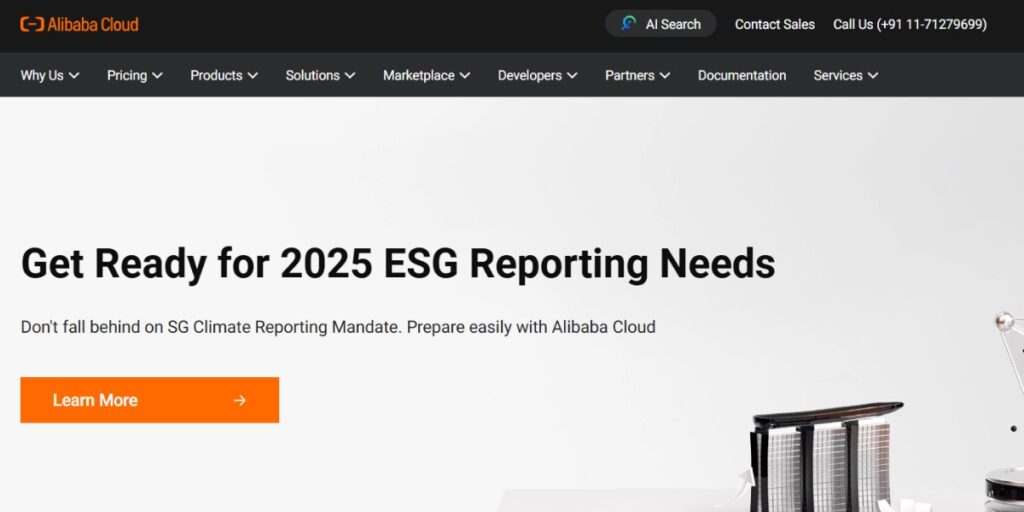
Alibaba Cloud is Asia’s largest provider of cloud computing services that provides integrated solutions for Artificial Intelligence, Big data, and the Internet of Things. ECS is referred to as a web service that supports scalable applications while MaxCompute; provides the environment for large-scale data processing.
Affordability attracts startups and SMEs; additionally, the company focuses primarily on the Asia-Pacific region for low-latency services. The enhancement of Anti-DDoS protection also brings more reliable security for businesses.
Key Features:
- A service of Amazon Web Service company and its offer is known as Elastic Compute Service (ECS).
- Big data processing can be done by choosing MaxCompute.
- Anti-DDoS security.
Pros:
- Affordable for SMEs.
- Of the four identified company types, there is a strong representation of companies in the Asia-Pacific region.
- Scalable infrastructure.
Cons:
- Fewer locations globally compared to AWS or Azure.
- Less customer support.
Ideal For:
- Small, medium, and large enterprises that need big data solutions especially the newly established startups found across Asia.
Pricing:
- Basic Plan: Free
- Developer Plan: USD 19.99
- Business Plan: USD 100.00
- Enterprise Plan: USD 8,000.00
Rating: 4.5/5
5. IBM Cloud
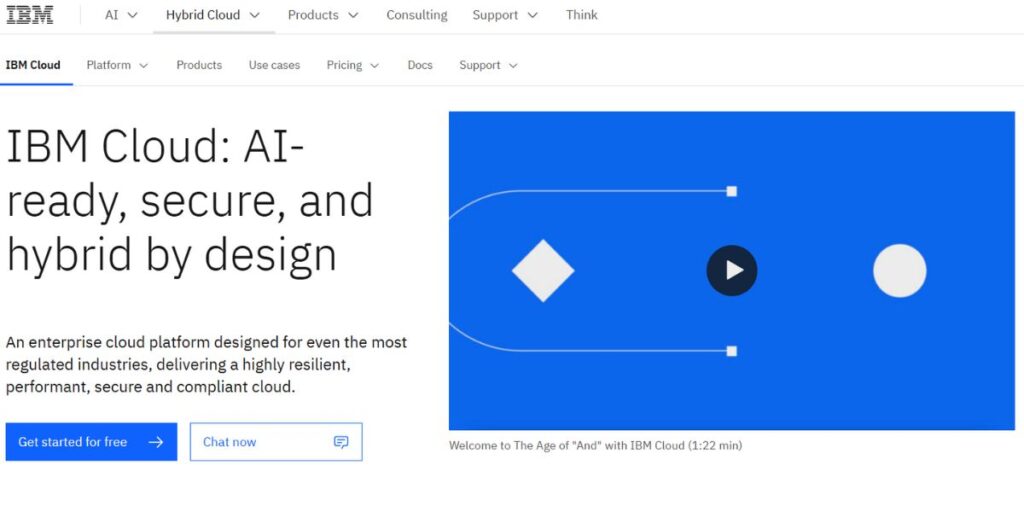
The particular player that distinguishes itself is IBM Cloud well known for supporting hybrid cloud structures and Artificial Intelligence resources such as Watson. It provides specific-oriented services in the finance sector, healthcare sector, and manufacturing sector. Its Kubernetes service offers support to containerized applications and its Blockchain platform provides secure and traceable transactions.
Still, the security and machine learning capabilities of IBM Cloud are enormous, but the price and some features’ complexity make it more suitable for large-scale businesses. It has variable pricing that can adapt to different usage tendencies, and what is more, the platform prioritizes innovative solutions, which guarantees efficient work for critical applications.
Key Features:
- IBM Watson cognitive computing & system.
- Kubernetes is a cluster management system deployed for colonies of containerized applications.
- The primary use of a blockchain platform through which secure transactions are made.
Pros:
- A high-quality hybrid cloud ecosystem is another strength of companies in the technological industry.
- The best of artificial intelligence and machine learning solutions.
- Enterprise-grade security.
Cons:
- Higher costs.
- There is a steeper learning curve for people and teams that are few.
Ideal For:
- Large corporations, and organizations involved in financial and healthcare services delivery in their operations.
Pricing:
- Flexible pricing based on configurations.
Rating: 4.4/5
6. Oracle Cloud
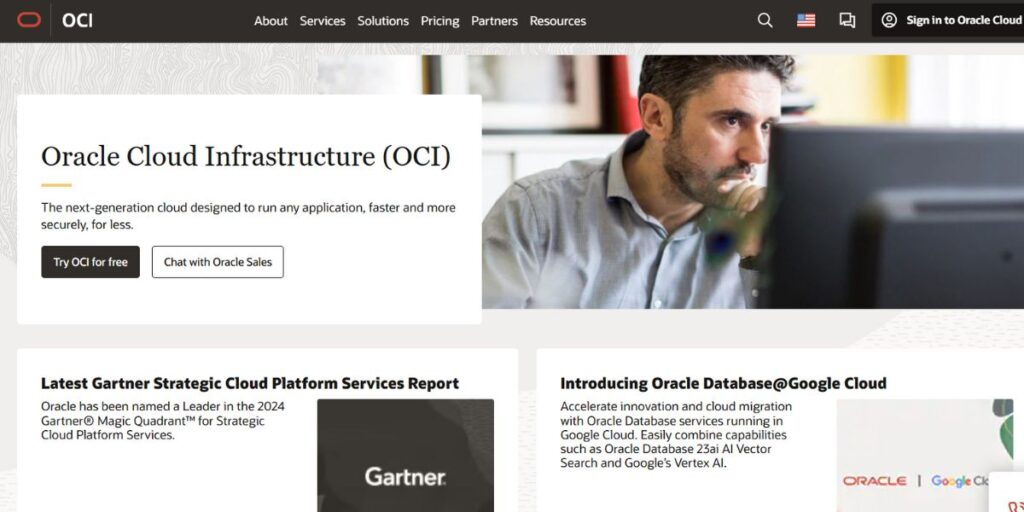
Oracle Cloud is oriented specifically on business services and provides such powerful instruments as the Autonomous Database for intelligent and safe data management. Substantial resource planning for improved business operations is one of the ways through which Oracle Cloud ERP improves organizational operations.
It also offers compute-optimized solutions for systems affected by high-performance computing (HPC). What is more, whereas Oracle Cloud has a great focus on industry solutions, it offers no real configurability and has limited support for SMBs.
Key Features:
- NoSQL Automotive for car driving the data intelligence.
- Oracle Cloud ERP for the ERP or Enterprise Resource Planning.
- Computing for high performance mainly incorporated the use of supercomputers, very large computers, or parallel computer systems to solve complex computational problems illustrated in the figure below.
Pros:
- Industry-specific solutions.
- Long-term dependable database management tools.
- Well suited for enterprise-class workload environments.
Cons:
- Limited support for SMBs.
- Higher complexity for setup.
Ideal For:
- Large business companies especially those operating in the finance and retail industry.
Pricing:
- Request For Pricing
Rating: 4.3/5
7. Tencent Cloud
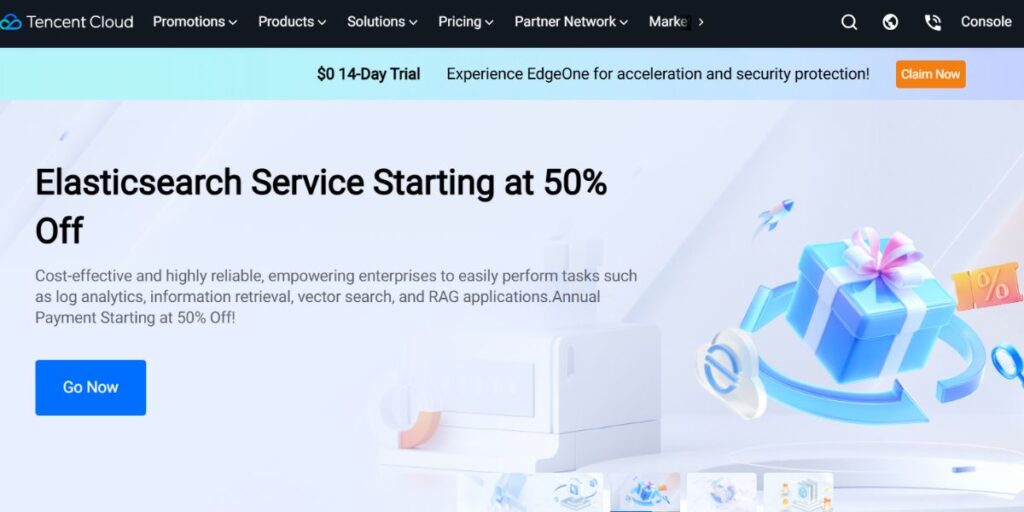
Tencent Cloud is growing in popularity, especially in Asia; it targets the gaming, video streaming, and e-commerce industries. The CVM is an outsourced infrastructure that comes with ca onfigurable scale; while CDN and Global Application Acceleration provide optimal content delivery.
Tencent Cloud is one of the most inexpensive cloud solutions today, specifically designed for industries that require media-heavy loads, and has a powerful regional base.
Key Features:
- Cloud Virtual Machine (CVM).
- There is an increase in Global Application Accelerated.
- High-end CDN solutions and services.
Pros:
- Competitive pricing.
- Specially designed for the computer gaming and media sector.
- Strong presence in Asia.
Cons:
- Limited global coverage.
- Less number of integration to other applications compared to its competitors.
Ideal For:
- Businesspeople in media companies, those who engaged in video games, and those who are in the e-commerce industry.
Pricing:
- Flexible with volume discounts.
Rating: 4.2/5
8. DigitalOcean
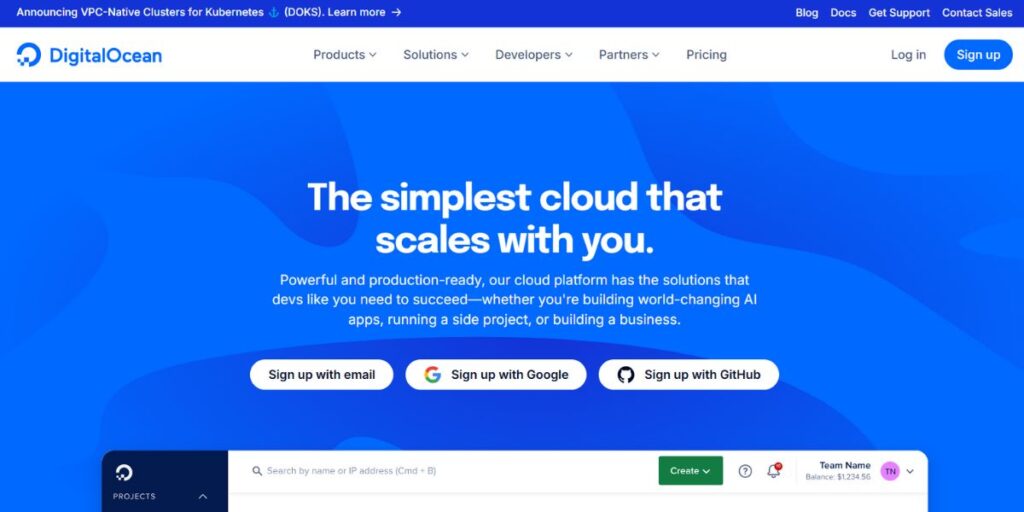
DigitalOcean guarantees simplicity and cheap prices that are awesome in the eyes of start-ups and developers. Its Droplets offer cost-efficient virtual servers, and the Kubernetes service solution targets complicated, innovative, and containerized applications. It is very easy for developers and comes with a powerful community that supports the application hosting and deployment.
This is very cost-effective for all businesses, especially new ones since the pricing is fully transparent and begins from as low as $4 per month. While it does not have many of the features of an enterprise-level system, it is more than sufficient for creating applications with less computational requirements and newly created projects.
Key Features:
- Balls for mass, virtual server without physical server.
- For containerized applications, there is none other than Kubernetes.
- APP Platform is a hosted application open platform for managed hosting of the App.
Pros:
- You have no Hidden Costs and our quotations are reasonable.
- Easy-to-use interface.
- Strong developer community.
Cons:
- Limited advanced services.
- It is not suitable for enterprise applications.
Ideal For:
- Entrepreneurs, small-scale enterprises, and developers.
Pricing:
- Droplet: $4/month
- GPU Droplet: $2.50/GPU/hour
- Kubernetes: $12/month
Rating: 4.6/5
9. Linode
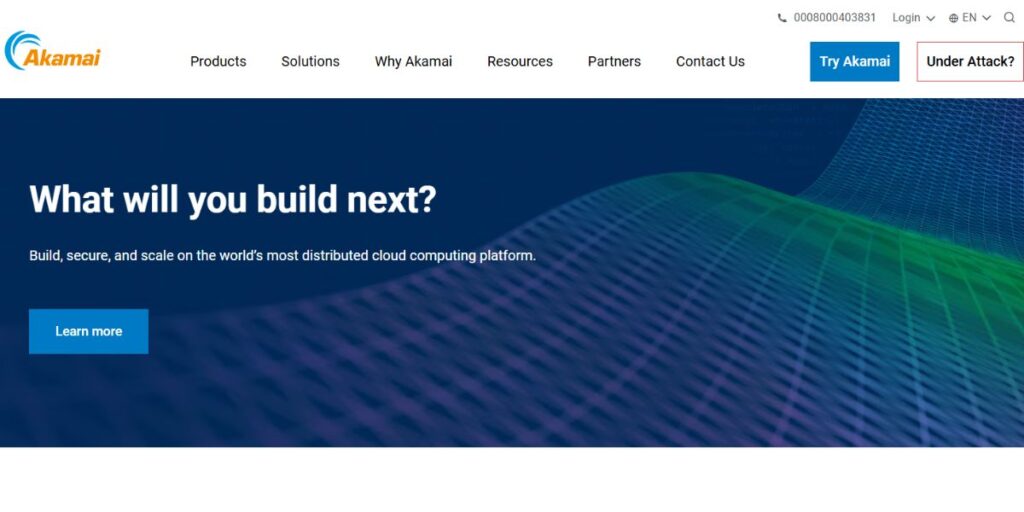
This company provides simple and cheap cloud server hosting for small business, then it is perfect for developers and small businesses. Its Compute Instances include website hosting, development, and other services, and the dedicated CPU solutions include the handling of resource-demanding jobs. By leveraging on advanced DNS management the domain configurations are made easier.
Regarding costs, Linode has an impressively simple and fixed-cost strategy and outstanding customer service.
Key Features:
- Compute Instances for applications hosting.
- Special-purpose processor for those tasks that require maximum utilization of the system’s resources.
- Advanced DNS management.
Pros:
- Transparent pricing.
- Excellent customer support.
- Simple setup process.
Cons:
- Fewer advanced features.
- Some basic, but not sufficient for serious mass enterprise-level work.
Ideal For:
- These include developers, startup businesses, and small-scale businesspersons.
Pricing:
- Custom Pricing
Rating: 4.5/5
10. Kamatera
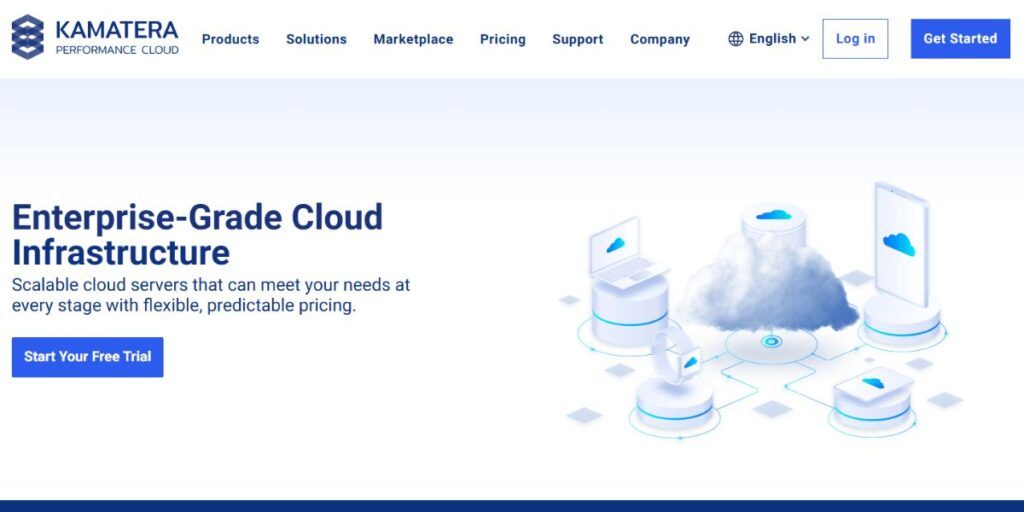
Kamatera offers affordable cloud products and services that allow customization for specific key objectives and goals. As it turned out, it provided proper solvable scalable infrastructure that made configurations of servers according to business demands possible. A presence in data centers worldwide and availability support which is available at any time guarantees the Kamatera company’s reliability and quick reaction.
It has a concept of ‘Pay after you use it’ with an obligation-free trial for 30 days of its use. Nevertheless, Kamatera offers an extremely flexible platform for its users but due to this, sophisticated customization abilities have their price – a higher level of complexity.
Key Features:
- It’s customizable server settings.
- Flexible cloud environment.
- 24/7 technical support.
Pros:
- Highly flexible.
- Global data center presence.
- Lack of ambiguity when it comes to price.
Cons:
- Limited additional services.
- Slopes up for further customized configurations.
Ideal For:
- Businesses need tailored cloud solutions.
Pricing:
- Pay-as-you-go with a 30-day free trial.
Rating: 4.4/5
Best Practices for Cloud Computing Platforms
- Understand Business Needs: Try to understand your needs first before selecting the platforms.
- Optimize Resource Usage: This should be done by applying the tools that are used for controlling costs.
- Ensure Data Security: Security should be embarked on regularly and also security should constantly be reviewed.
- Leverage Automation: Minimize cost by automating several processes within the company.
- Train Your Team: Dedicate resources to how to use the platforms efficiently.
- Adopt Multi-Cloud Strategies: This is particularly so if the person engaged a specific provider so as to avoid being locked into that selected provider.
Conclusion
It is shown that cloud computing platforms in 2025 have significant opportunities to provide organizations with high levels of rental, flexibility, analytics, and artificial intelligence. Through the proper selection of business platforms organizations can encourage creativity, performance, and sustainability in the market. These platforms contain the necessary tools for any business, no matter if you are a start-up or a rather big company.
FAQs
Who will provide the most significant cloud computing services in 2025?
AWS, MS Azure, Google Cloud, AliCloud, IBM Cloud, Oracle Cloud, Tencent Cloud, DO, Linode, and Kamatera.
What is the most suitable platform for a startup?
For startups, both DigitalOcean and Linode deserve special attention because of their prices and ease of use.
What kind of security improvement do the cloud computing platforms bring?
They have secured data and application options for encryption, firewalls, and monitoring tools.
Is going multi-cloud a good idea?
Yes, multiple platforms can mean flexibility and the avoidance of getting locked into one system by a specific vendor.
What is the price of cloud platforms?
They depend on the usage and the services offered, and frequently user pays for them.

